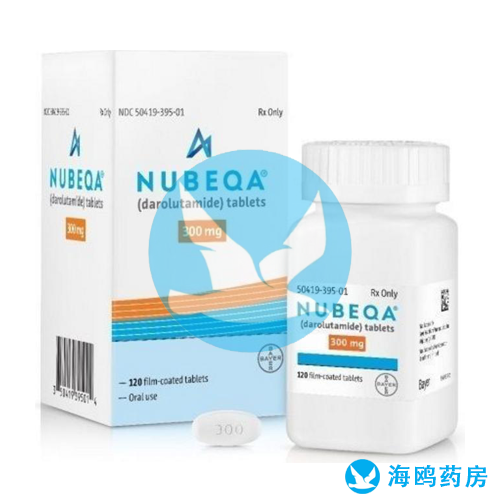
Nubeqa
Bayer heathcare AG, Germany
$11160.00-
SelectSpecification/Number
-
ParameterDetailed information
-
NoticeCustoms clearance instructions
-
Required readingConsumption notice
- Description
- Information
INDICATIONS AND USAGE(适应症)
NUBEQA is indicated for the treatment of patients with non-metastatic castration resistant prostate cancer (nmCRPC).
DOSAGE(服用剂量)
The recommended dose of NUBEQA is 600 mg (two 300 mg film-coated tablets) taken orally, twice daily, equivalent to a total daily dose of 1200 mg. Swallow tablets whole with food.
Patients receiving NUBEQA should also receive a gonadotropin-releasing hormone (GnRH) analog concurrently or should have had a bilateral orchiectomy.
Advise patients to take any missed dose as soon as they remember prior to the next scheduled dose, and not to take two doses together to make up for a missed dose.
ADVERSE REACTIONS(不良反应)
Because clinical trials are conducted under widely varying conditions, adverse reaction rates observed in the clinical trials of a drug cannot be directly compared to rates in the clinical trials of another drug and may not reflect the rates observed in practice.
ARAMIS, a randomized (2:1), double-blind, placebo-controlled, multi-center clinical study, enrolled patients who had non-metastatic, castration-resistant prostate cancer (nmCRPC). In this study, patients received either NUBEQA at a dose of 600 mg, or a placebo, twice a day. All patients in the ARAMIS study received a concomitant gonadotropin-releasing hormone (GnRH) analog or had a bilateral orchiectomy. The median duration of exposure was 14.8 months (range: 0 to 44.3 months) in patients who received NUBEQA.
Overall, serious adverse reactions occurred in 25% of patients receiving NUBEQA and in 20% of patients receiving placebo. Serious adverse reactions in ≥ 1 % of patients who received NUBEQA included urinary retention, pneumonia and hematuria. Overall 3.9% of patients receiving NUBEQA and 3.2% of patients receiving placebo died from adverse reactions, which included death (0.4%), cardiac failure (0.3%), cardiac arrest (0.2%), general physical health deterioration (0.2%), and pulmonary embolism (0.2%) for NUBEQA.
Permanent discontinuation due to adverse reactions occurred in 9% of patients receiving NUBEQA or placebo. The most frequent adverse reactions requiring permanent discontinuation in patients who received NUBEQA included cardiac failure (0.4%), and death (0.4%).
Dosage interruptions due to adverse reactions occurred in 13% of patients treated with NUBEQA. The most frequent adverse reactions requiring dosage interruption in patients who received NUBEQA included hypertension (0.6%), diarrhea (0.5%), and pneumonia (0.5%).
Dosage reductions due to adverse reactions occurred in 6% of patients treated with NUBEQA. The most frequent adverse reactions requiring dosage reduction in patients treated with NUBEQA included fatigue (0.7%), hypertension (0.3%), and nausea (0.3%).
For full information, please refer to:
https://nctr-crs.fda.gov/fdalabel/services/spl/set-ids/1a7cb212-56e4-4b9d-a73d-bfee7fe4735e/spl-doc?hl=Nubeqa
Nubeqainformation